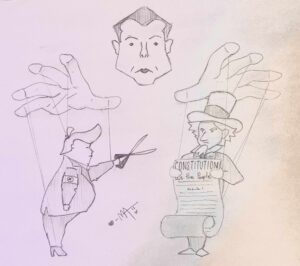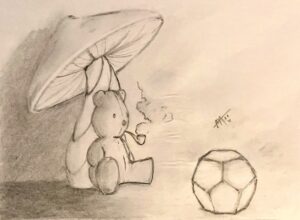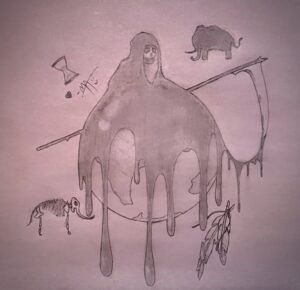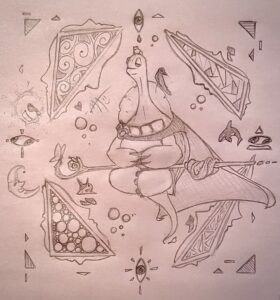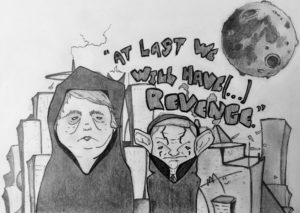Author: Matthew
Inspiration:
A continuation of the previous rambling . . .
“To be a star, you must shine your own light, follow your path, and don’t worry about the darkness, for that is where the stars shine brightest. Always do what you are afraid to do, always do what you are scared to do. And remember, every man and every woman is a star.”
-Sakis Tolis
Years ago, my older sister and I met at a downtown Atlanta coffee shop to discuss our insufficiently nurtured inclination for personally-gratifying creativity.
She and I sat at the table, a sketch pad between us, doodling in our fashion. She had, and still has, an eclectic fashionable sense for decorative aesthetics (clothing, décor, and communicable exclamations). My desires have long been gratification through entertainment in varying degrees of subtlety.
She and I decided then, well over a decade ago, to exercise and communicate these inclinations eventually digitally. I believe in that moment, the seeds for what would, some six years later, become our corresponding blogs (a progressively outdated mode of communication). Nevertheless, we nurtured these desires until she—my sister—produced “cafethenightaway” for her love of staying up late over a pot of hot coffee in a cozy, lamp-lit, enjoyably decorated environment to discuss what mutual interests may manifest. This proved challenging for her as a mother of two and her attention to this outlet exponentially waned. As my interest in this endeavor was constrained, balanced, and dependent by and upon our collective participation, I ultimately allowed mine to do the same, having disregarded what was ultimately unsuccessful frivolity anyway.
As I consider, now (or lately anyway), our global and sociological paradigm evolutions, I can’t help but hunger for some outlet to discharge these potentially psychologically-calamitous considerations. So, to exercise a creative and artistic desperation, I return to my lonesome platform to produce whatever inspired considerations cerebrally fester. Perhaps the future will play out positively and perhaps this sort of self-therapy will help prepare myself for that hopefully, minimally doom-ridden reality glistening off the future’s horizon . . . but perhaps not.
So, for myself, the happenstantial passerby, family member, or friend, welcome to whatever the fuck I decide to write about . . . again.
-Matt
Note: The sketch above is of Bearspot—my teddybear—from this meeting with my sister. This was eventually turned into a short story here.
“Time is continually pressing upon us, never letting us take breath, but always coming after us, like a taskmaster with a whip.”
-Arthur Schopenhauer
Half a decade?
Yeah . . . well, sorry. Not like anyone reads this incoherently vivid verbosity anyway.
There was a time, long ago, when half a decade seemed endless . . . so quick it flies now—the rhyming of history. And how wasted was it? I’m not sure it has been.
The value of what marrow we extract from life is only ever up to us. But whatever that value is seems so regularly displaced by a contemporary, sociologically-imposed perception of necessary aesthetical participation—it’s heavy . . . and constant. We’ve been drugged . . . distracted . . . hypnotized . . . enslaved . . . to disregard any inclination for a non-prescribed obedience to our unique enjoyments.
Yet, despite our pseudo-global, progressively dystopian, neo-liberal, end-stage-capitalistic hellscape, there’s a refreshing recapture of wasteful frolic as our distracted fascination wanes. Not all . . . or everywhere . . . but sometimes . . . and someplaces. Class solidarity, global empathy—humanity’s desperate gasp for a lovingly-collective compassion fending off those frightened by the curtain being pulled back—are remanifesting (I presume what empathetic envy we bear for our indigenous/aboriginal contemporaries and their ancestors—those of us that have it—blossoms from some hopeless desire to participate with the planet, one another, the life around us, and ourselves in such a way instead of conquering it).
It’s fun to revisit what I once thought clever, even if it reads poorly, incoherent, incapacitated, or boring. I think, though, considering now’s all, I’ll return . . . even if only for individually exercisable psychological-preservation and the maintenance of primitive practices.
Maybe the marrow’s richer now.
“The greatest gains and values are farthest from being appreciated. We easily come to doubt if they exist. We soon forget them. They are the highest reality.”
-Thoreau, Walden
-Matt
Title quote from Fit for an Autopsy’s Black Mammoth
“My river runs to thee”
-Emily Dickensen
I again require an outlet.
The time it’s been since it last seemed so was much. I’ll discuss that later.
Anyway, the posts before this are old . . . perhaps terrible—(t)read cautiously.
“It’s a new dawn; it’s a new day”
-take your pick <3
-Matt
Title quote by Mark Twain
Are you trapped in an area of the country where scientific illiteracy and an overall unapologetic ignorance has got you totally bugged out? Do you want to know how to engage with the individuals among you in that area to encourage an honest abandonment of their emanating imbecility?
Well, don’t we all.
Now, I don’t mean to isolate the bible belt as a unique regional cesspool of bungling idiocy. But it is. During so calamitous a time as we find ourselves in now, individuals are struggling with perhaps a uniquely capitalistic existential crisis. Should I sacrifice my health and well-being to provide for those I care about, potentially endangering them? Or should I abandon my inclination to provide in order to protect loved-ones and citizens in the long run? This is a daunting position to be in. Typically, individuals must ultimately answer questions like this for themselves if they’re to legitimately employ their values in a problem-solving way. But our society is structured such that somebody with a value-system encouraging them to isolate could rapidly impoverish not only their reality, but the reality of the very loved-ones they want to protect.
It’s a false manifestation of existentialism since the right answer is pretty fucked. People in the United States simply cannot not make money. Our continued participation in the workplace safeguards not only the powerful elite—heavily invested in the stock market—but also our ability to provide for ourselves and our families. And while mass citizen economic abandonment is truly the fear of the powerful elite, they must find reassurance in the average individual’s necessity to work. It is a juxtaposition of power maintenance and mere existence. So, the ethicality of economical sustenance amid a pandemic which plagues the fragile is certainly minimal, if not non-existent, but few American citizens are financially situated to employ ethicality in deciding what to do here.
The decision becomes even harder in the bible belt. Georgia, where I live, is led by so bungling an idiot that now, while we as a country test so few per capita and thus barely know who among us may be carrying this virus, our state is charged with getting back to normal. What constituted a non-essential business here already pushed the envelope. Now, pretty much everybody aught to just get back to work.
At the very least, steps should be taken to adapt each social environment to as least deadly a situation as possible. I wear a mask and goggles at work, where we have been significantly busier than ever. Even still, I hear from many individuals in my area that “this is a democratic hoax,” or “it’s all to make Trump look bad.” These individuals often quote the nonsense or pseudoscience their fed on either Faux News or conservative radio. Many champion the savior treatment Hydrochloroquine, which had they done a smidgen of research would see that there is little to no benefit and possible harm from incorporating this Lupus treatment into the toolbelt of medical professionals around the country. We’ll see if this propaganda continues to be parroted by these media-sheeple now that even Faux and the president have abandoned this drug.
So we have:
– Scientific illiteracy
– Mass ignorance
– Powerful incentives to work
– Leaders encouraging unsafe conditions
and
– Brainwashed imbeciles regurgitating force-fed horseshit.
Now, it is increasingly likely that COVID-19 is less deadly than originally thought. And while that is to some extent reassuring, as the percentages of individuals with anti-bodies indicate a heard-immunity on the up-and-up, the practical measures to ensure that as that happens the fragile among us endure as well are sadly being abandoned. What can we do? I guess go bowling and get our hair done.
No, don’t stick your fingers in the same balls other people’ve just used. And have a partner or loved one cut your hair . . . or cut it yourself.
It’s difficult for me to implore any individual to stay home though because I’ve worked this entire time and I have yet to experience the economic misfortunes plaguing so many right now. At any rate, I hope you guys can employ your own values to your best ability to make the most reasonable and beneficial decisions for yourself and those you care about. Be safe and God bless!
-Matt
“With flames as manifold resplendent all
Was the eighth Bolgia, as I grew aware
As soon as I was where the depth appeared.”
-Dante’s Inferno, Canto XXVI
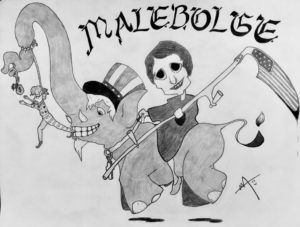
Motivation is an elusive mistress and often manifests amid idle hours. Nevertheless, her fruits respire a lively oneness, the achievements of which are the hallmark of life. Woe be to those whom she regularly infrequents.
“At first, man was enslaved by the gods. But he broke their chains. Then he was enslaved by the kings. But he broke their chains. He was enslaved by his birth, by his kin, by his race. But he broke their chains. He declared to all his brothers that a man has rights which neither god nor king nor other men can take away from him, no matter what their number, for his is the right of man, and there is no right on earth above this right. And he stood on the threshold of freedom for which the blood of the centuries behind him had been spilled.”
-Ayn Rand, Anthem
It is indeed odd to find that those who champion this particular muse minimize any legitimate aspect of egalitarianism in so empathetic a quote to preclude other individuals’ potential to achieve it. To be sure, the “free-ness” of a Rand-like philosophy is very much semantically maximized, frivolously charging constrained subordinates nationwide to exercise their fruitful potential whilst frolicking amid an ever emburdening livelihood. Contemporary Republican parsimonious attendrissement encourages our diligent citizenry’s passivity despite a waning provisional procurement, particularly considering the fervorous fidelity expected by affluent liege-like overlords. The continually degenerating psychological turmoil collected during a progressively intolerable subjugation, necessary for mere existence, albeit, geographically-dependent, often insufficient, thwarts any preservation or manifestation at all of a Rand-like oneness. The creation of a nation of “second-handers” is no easy prescription from which to self-liberate. It is fraught with economic turmoil. Thus, a most abysmal depression manifests amid occupational reconsideration. So precarious is any self-serving exodus, regardless of its temporariness, that any attention to betterment is thoughtfully suppressed. Lo, even if the escape occurs, one must then embrace barely survivable capital-provisions, which often exhaust before securing even a weekly livability.
The charge of a Pseudo-Randian disciple is to encourage each of the 330 million among us to participate in an entrepreneurial enterprise of whatever the sort their luxurious abundance of capital and free time will afford–an obvious solution on the eve of automation.
“Yes! And isn’t that the root of every despicable action? Not selfishness, but precisely the absence of a self. Look at them. The man who cheats and lies, but preserves a respectable front. He knows himself to be dishonest, but others think he’s honest and he derives his self-respect from that, second-hand. The man who takes credit for an achievement which is not his own. He knows himself to be mediocre, but he’s great in the eyes of others. The frustrated wretch who professes love for the inferior and clings to those less endowed, in order to establish his own superiority by comparison. The man whose sole aim is to make money. Now I don’t see anything evil in a desire to make money. But money is only a means to some end. If a man wants it for a personal purpose–to invest in his industry, to create, to study, to travel, to enjoy luxury–he’s completely moral. But the men who place money first go much beyond that. Personal luxury is a limited endeavor. What they want is ostentation: to show, to stun, to entertain, to impress others. They’re second-handers. Look at our so-called cultural endeavors. A lecturer who spouts some borrowed rehash of nothing at all that means nothing at all to him–and the people who listen and don’t give a damn, but sit there in order to tell their friends that they have attended a lecture by a famous name. All second-handers.”
-Ayn Rand, The Fountainhead
It’s really as if the current Republican torchbearers’ve conjured some sinister doppelganger spirit of Ayn Rand to lately commandeer the Republican party and perpetuate a false patriotism to indenture a gullible populace. But this depraved contortion of Lincoln’s party has no greater claim to American prosperity than anybody else. So read Ayn Rand, because it’s good stuff, and don’t let the Republican second-handers, hoping to scapegoat their ravaged reality upon us all, convince you that what she has to say is anything but what you find in her pages for yourself.
I hope you’ve all enjoyed a powerfully contemplative Independence Day.
-Matt
“…I find that I am wandering beyond the limits of my walk and will therefore bid you adieu.”
-Thomas Jefferson to James Madison, Oct. 28, 1785
Copyright © 2019 Matthew Bell. All Rights Reserved.
Gilfred Wayne Osiris (Freddy-Wayne for short) didn’t know it, but whatever typical anatomical-degradation had accompanied his everyday, average aging had also been aggressively expedited by his loquacious consumption of that syrupy delight–honey-rye whiskey on the rocks. But, irregardless of this, since he was entirely unaware of it, although he’d had his suspicions, Freddy-Wayne decided there’d be no more drinking for him . . . after one more night anyway; and he’d arrived at so seemingly brash a conclusion after the recent, dramatically-inflated legal consequences regarding any such indulgence whatever. Truly, drinking had become a dangerous frivolity, akin to hypocodrone and practically-meth. It seemed the leader of the free world and his legislative specialist had declared aggressive punishments for any individual involved in an arguably-discernible mind-altering avocation and the on-the-spot execution of any individual either peddling the contributory wares or in possession of “excessive narcotical quantities.” This was a real bummer for drunks and their dealers . . . I mean bar owners.
Poor Freddy-Wayned had attempted all the last month long to abandon his fancy for the sauce, but no try would take root. And on this night there was not a drip of substance at his house, and so Gilfred Wayne Osiris had had to brave great peril for a sip at the last local spot to still serve the ruinous dribbles of the devil’s water. So there he sat, savoring every unforgivable drop. One by one, the glasses emptied down the delightable tippler’s gullet until he could hardly produce a reasonable sounding sentence for the gentleman to his left:
“Seems so strange to come time I myself be abandoning all those luscious driplets of whiskey and the sorts, the government gone declared the termination of evildoing drug-kinds . . . even if they ain’t killed nobody.”
The man sitting at Freddy-Wayne’s left was steadfastly situated atop his stool, in a crisp brown suit, and having a glass of icy lime-water:
“Whatever seems so strange about it, good man?”
“It just ain’t right, you know. Gotta have someway to escape.”
“Oh, simple citizen, best be on your way, lest you collect some trouble; wouldn’t you say?”
“And why is that, Mr. Coffee suit? It’s my last night ain’t it? Why should I leave?”
“Because, woodland spirit-drinker, we are here to end the peddler of which fruits ye now take.”
At that moment, merry Mr. Marmenheim–the tavern owner and its regular tender (a double strike for him)–was with great effort dragged from the back room out into the bar and dropped on the floor. He’d been so severely battered that Freddy-Wayne could hardly recognize his longtime friend and confidant.
Now, Mr. Marmenheim was almost exclusively jolly, but lately his protestuous inclinations had enraged a fervent disobedience regarding the swift outlaw of indulgeable substances. He’d refused to shut his doors and continued to alleviate his patrons’ daily woes to a capitulatory incapacitation up until this very night. His unapologetic judicial disregard would henceforth never again materialize into some substantive distribution.
Mr. Marmenheim gasped a curdling appeal for air which flung spritz of blood across the floor. The two men who’d dragged him out into the bar had certainly defeated the barkeep’s formidable physique, but at considerable damage to themselves. They were panting, bloodied, and disheveled. Evidently Mr. Marmenheim had put up quite the fight.
They dragged Marmenheim to the man in the coffee suit, who collectedly erected himself at the man’s devastated condition:
“Do you, Mortimer Marmenheim, admit the legitimacy of your being charged with being in possession of extremely large quantities of drugs?”
To which Mr. Marmenheim gurgled a surprisingly boisterous: “What!? Hell No!!”
But the gentleman in the coffee suit cut him short with a deliberate: “Nonsense!” He motioned to the two men, who were in fact members of the police force: “Officers.”
The policemen lifted Mr. Marmenheim on to the bar and flattened his back down soundly. Creamy gobs of ether were smeared under his nostrils as Mr. Coffee Suit himself produced a pair of needled vials filled with fluorescent liquids. The officers on each side restrained any of the victim’s floundering the ether’d yet subdued. The first needle slid into Mr. Marmenheim’s arm. The iciest sensation crawled through the man’s veins leaving behind a fleeting sensation of warmness. The chemically-intensified realization of his final moments alive stirred the once-jolly bar tender’s thoughts to his wife and daughter. His lips fumbled a nearly inaudible: “please . . . no . . . ” And with that, Mr. Marmenheim went limp in the arms of his fast-holding civil-servants.
“How did you like that, Mr. Gilfred Wayne Osiris?” called the man in the coffee suit.
Gilfred Wayne fell from his stool and staggered backwards toward the doors.
“Not so fast, my good man. Gentlemen, please bring him to me.”
Gilfred clambered to his feet and made for as quickly a bound as his body could muster to the hopefully awaiting safety outside, but it was of no use. His determined survival was no match for the failed reality of inebriated kinesthetics. Freddy-Wayne fell almost immediately to the floor and sunk into a brief visual blackness.
When Gilfred Wayne Osiris came to, he was in the clutches of the very officers who’d assisted in his bartender friend’s single dose of capital punishment. The ghastly likelihood of his similar demise panicked a medley of violent frolicking which contributed minimally, if at all, to any possibility of Freddy-Wayne’s imminent escape. And with that the men raised him up and flattened him atop the bar as they’d done to Marmenheim’s tattered body moments before.
The gentleman in the coffee suit appeared over Freddy-Wayne and calmly exhibited the glass syringe with its glowing contents as the officers applied the probably unnecessary gobs of either under his nostrils. Gilfred shuddered; the second needle was for him. It pinched into his arm with the cocktail’s hallmark icy surge. Freddy-Wayne felt light and happy. The vial’s contents seemed to quench his thirst, and he relished amid the chilly pleasantries of chocolate and coconuts until his ability to produce astounding recollections extinguished forever on the last night of Freddy-Wayne’s frivolous narcotical indulgence.
Have a nice day guys!
-Matt
Copyright © 2018 Matthew Bell. All Rights Reserved.
Cartoon quote from Star Wars: Episode I — The Phantom Menace.
Italicized snippet taken from an actual memo by Jeff Sessions articulating his hopeful employment of capital punishment for nonviolent drug offenses.
“Ye shall know them by their fruits.”
-Jesus
“Man of the worldly mind [. . .] do you believe in me or not?”
-Marley
“Nothing is so firmly believed as what we least know.”
-Michel de Montaigne
It is that merriest of momentous festivial yearly-conclusions, when that Turkishly saint stuffs my socks with old trees and steals all my red hair ties . . . but I have plenty of pink ones, which, evidently, that night-flying Huckleberry and his Moorish companion are too frivolous to realize is simply light-red. I suppose then, though, they (being those ties with a light-redishly hue) would off-balance that Babbo’s dear crimson snow suit, lest it be faded or fluorescently ‘80s.
But this all must be wrong; it most clearly ain’t right–that blonde-ginger fake news host (Ole Meganly Kelly) has televiciously tribed that Saint Nicholas is white . . . or was . . . I don’t know. That’s queer, I suppose; though, Old Clause could’ve been a geographical odd-ball with the purest of skin.
This, once again, as believed by the Kelly, is a condition which has not only sabotaged the dermatological regularities of Santa Clause and Michael Jackson, but also the Jesus, whose well-documented monochromatic illumination greatly contributed to his founding of the United States some six thousand years ago . . . or something like that.
Ah, yes . . . the one and only gentle Jesus. You know, the humble Jew who hates fags, kills the poor, heals only for profit, disenfranchises women, rides a horse, wears a cowboy hat, shoots black people, and accuses everybody of harassment and microaggressions. I mean he definitely didn’t go about bronze-aged Palestine (where whites are well-known to’ve retrospectively dwelt) sometimes on a donkey, or in sandles, hanging out with twelve totally heterosexual dudes and an energetically-clingy possible-whore. I guess Jesus could be a collaboration of all those contradictory, coincidently contemporarily-compatible dispositions . . . in which case he’d be kinda like Richard Gere–some rich douche, wooing a kind-hearted harlot (who may or may not have herpes . . . probably she does though). Yeah, I could live with a Richard Gere Jesus.
Ah-hah, but no! Jesus is Alabama man-Jesus, and you can bring his extra-white ass to the motherfucking “bowling alley where he drinks heavily and chews tobacco.” Alabama man-Jesus is also “almost impossible to steer, and [he] glows in the dark.”*
One thing’s for sure–Jesus has liberally-lengthy, lavantishly-locky, lovely long hair, which the other gospel of Matthew tells us has been worn up in a bun since the end of ‘04. I wonder if Santa steals his hair ties too . . . and on his fucking birthday . . . goddamn!
Merry Christmas Everybody!
-Matt
BTW, my sister also has a blog called cafethenightaway.com. It’s much better than mine, so check it out!
Copyright © 2017 Matthew Bell. All Rights Reserved.
*Disclaimer: All references to Alabama Man and Wild Wacky Action Bike are the ideas and intellectual property of the South Park creators and are entirely their comical ingenuity.
Title quote by Charles Dickens.
Hello and Merry Christmas!
Did you know that, according to some Ancient Astronaut theorists, a mighty extraterrestrial, often called something like ‘Wodnes,’ descended the heavens amid that very miraculous an astronomical event—the winter solstice? Indeed, it is true. Good Wodnes, piloting his lofty luge, ferried along by his octet of perilous steeds, would befall a torrent of good cheer upon humanity. Trailing his hibernal visits were droplets of goodies for his admirers and charred remains for his foes. The man’s curly mane and fluffy suit of periwinkle and frosting were seldom forgotten between annual returns.
‘Periwinkle?’ . . . is that right? I was sure that was the right word. It turns out to be probably not the right word. But if you’re trapped under a downed camel that’s unwilling to roll out from under the most burdensome cargo, you’ve likely not got with you some contemporary English usage book . . . or it’s on top of the camel. But you’ll power through, which I did. And when I finally escaped, I was like:
“Oh my, where’s fled the time? Have we thus abandoned Beltchat aloft the periwinkle of discarded attempts—that downtrodden spiral of exercisable frivolity? Indeed, to be sure, we’ve certainly not!”
And, careless of ‘periwinkle’s’ proper perception, I sprinted off to my word processor to reproduce what compositional peculiarities I’d amassed amid my camelous imprisonment, plucked from what recollectable cerebration had survived all that heat, spit, and hey.
Nevertheless, I do so apologize, of course, but Ben Carsen and I’ve been licking the huff off his glue pops to fix America’s housing dilemma back together again (Otherwise I’d have been writing all this time). So far there are nearly a hundred and forty pyramids for which to store grain. Good job.
Anyway, did you know that December is the month of stuffed animals? Truly, it is.
I always had plenty of stuffed animals growing up to encourage my pre-adolescent zoological inclinations, but I’ve only ever caught one turning its head to watch me, and that was Bearspot—my teddy bear.
I remember I used to line all my animals up around my bed and either hold some combative competition or entertain them with some whimsical adventure. I also had a blue and white bird, Sky, who had a mirror in his cage. Once, when I was changing Sky’s water, I caught a glimpse of Bearspot in the mirror, who was looking straight ahead. When I replaced the water bowl, and looked at Bearspot once again, he was looking right at me. I whipped around to find my stuffed friend back looking straight ahead. I always felt thereafter that Bearspot was quite real.
Of course, this is bullshit; but, there manifests a particular bond between a child and their singularly favorite stuffed animal. And if you’ve never known this relationship, then I shall weep for you.
I received Bearspot on my first Christmas and have now dragged him along many of my life’s adventures, including the first time I flew a plane—Bearspot floated in midair during a nosedive . . . it was special. He now sits on my desk, encouraging my studious creativity. I’ll often put a book out for him when I leave. Most recently it was The Satyricon, but I think he swapped it for Alice in Wonderland (who could blame him).
Now the tale to come, I should warn, can only be recalled retrospectively, as it begins with my death, which is fine as we shall all die. Of course, this tale could hardly begin should I not die, and you’ll soon know why. But first, let me tell you a bit about that one special stuffed animal you so dearly cherished amid your hopefully imaginative childhood.
“Man is most nearly himself when he achieves the seriousness of a child at play.”
-Heraclitus
There exists amid some magical reality a fantastic woodland realm, which sprung from the overgrown flora aloft the most monstrous of mushrooms. A bubblegum sky illuminates the evergreen wood with the warmest meadows and cranberry pleasures. And, in case you’ve no thought for scale, and why should you, this place is veraciously immense. It is called Mushrest, and amid its cozy comfort there is indeed much rest to be had.
It is here where stuffed critters reside, living in little tree trunk cottages with warm bake and smoke billowing from their chimneys. These little bundles of joy dwell in their homes and walk about the wood until beckoned to serve as companion to some happy little child. The call could come at any time.
A soft bell rings inside a wooden box on a table as a small patch of parchment rolls out from an opening in the front. Depending on the type of stuffed creature receiving it, the note may read something like:
A young girl has been recently given a handsomely stuffed green alligator. She seems to already care for it very much. Would you be interested in assisting this adorable human child along a hopefully imaginative childhood?
Should the stuffed alligator, and let’s call him Widdle, decide to be this child’s companion, he must simply write ‘yes’ at the bottom of the patch, roll it up, and slide it in the hole on the side of the box, at which time a small parcel is dropped at the alligator’s door, containing a cloth-wrapped bit of carrot cake and a brass/wooden hourglass. Widdle then concludes his necessary affairs, eats the bit of carrot cake (which is really just enough for one bite anyway), crawls into bed, flips the hourglass over on his nightstand, and waits the slumberous assumption of his charge to slip upon his heavy journey.
He will thus wake amid the arms of a loving child and assist their Earthly reality as best he can, and, when he is ultimately forgotten and abandoned, Widdle will find himself back in bed, comfy under his blanket, next to a halted hourglass, which will have completed some portion of its one hundred year potential.
It is not the fabrication of a stuffed critter which sparks the breath of life into a fluffy companion but the moment of expressed affection which beckons them to join you.
Once, when I still lived in Kennesaw, Georgia, my older sister had come to visit me before a particular test necessary for possible acceptance into a graduate school program. We sat at the Marietta Starbucks, which was, as Starbucks go, not very good . . . of course, I was not a regular Starbucks goer way back then and so could not properly gauge the potential introvertable recovering satisfaction a mid-work Starbucks break could produce. I am now, and it’s a fascinating addiction. Augusta’s Starbucks are all pretty good . . . although, I can only ever seem to get accurate beverages at one location’s drive-thru . . . at 4:30 am. But who cares—the Starbucks drive-thru is for fools, right? If I don’t sit for a few minutes and just leave after getting my drink, it takes only three to five drive-thru cars worth of time for me to be pulling from the parking lot. The most convenient Starbucks between my house and work nearly always has ten or more running vehicles waiting for their convoluted, almost-coffee, overpriced, affluent indulgence. Too harsh? My bad; however, If you get real coffee from Starbucks . . . it is amazing. Add espresso and it’s basically the best tasting snow you’ll ever consider everything on.
Anyway, my sister and I had visited the Art supply store she frequented while studying Architecture and were now just relaxing at Starbucks, doodling on a large sheet of construction paper. It was placed between us, on top of one of those too-tiny, two-person Starbucks stool/tables. She and I doodled all kinds of ridiculous things. I recall her happening to draw something which resembled a teddy bear sitting under a mushroom with a pipe. That was six years ago, and I’ve been writing little journeys for my teddy bear explorer ever since. It’s certainly something fun to write when I can think of nothing else.
And with that, have a very Merry Christmas everybody. Enjoy family and anyone close enough to give you the feelings of familial equivalence.
-Matt
Copyright © 2016 Matthew Bell. All Rights Reserved.
Now we have heard tell of Moultine Monck and his deeds, the fall of young Mary, and the musicians’ tragedy. And there is a final story here to tell. So let us begin:
Leshy
Part three (part one, part two)
“If able, I would bear it, I do not deny my effort—but the god of Love has conquered me…”
-Orpheus

